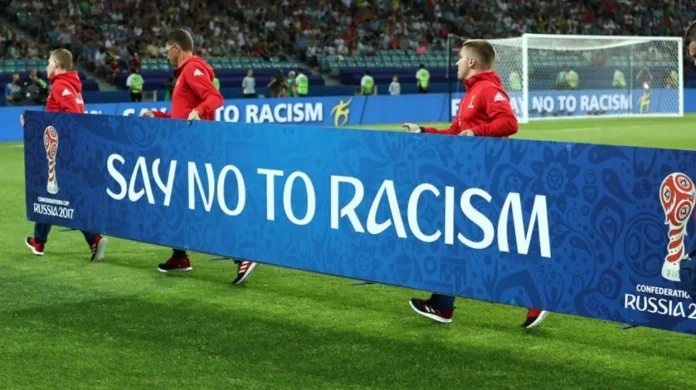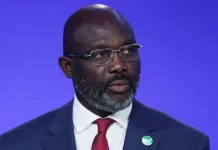In early 2025, FIFA announced a new 16-member panel, dubbed the Players Voice Panel, which was to be chaired by former Liberian president and football icon George Weah as a mark in the efforts by the sport to combat racism.
As world stars such as Didier Drogba and Briana Scurry joined the program, there was a wave of hope that the most influential body in football in the world could finally be focusing on important change.
However, after almost nine months of operation the panel is still not clear as to its influence. There are inconsistencies in enforcement practices on the ground despite commitment of zero tolerance and headline announcements. The anti-racism campaign of FIFA seems to be suffering structural inertia, and legal inconsistency, as well as expanding credibility gap.
The Symbolism Of Star Power Vs. Institutional Will
The Players Voice Panel is a sign of FIFA to humanize and decentralize its anti-racism agenda. Through the appointment of celebrated players, FIFA tried to add a touch of reality to a process that was frequently discussed as detached by bureaucracy.
But with racism in play and on the internet, the question arises as to whether action institutional change is supportive of symbolic representation.
The Promise Of Player-Led Change
FIFA welcomed the panel at the beginning as a component of its Global Stand Against Racism movement campaign. Development of policy, reforming of education materials, and disciplinary advice was left to members. In the unveiling of the panel in Zurich, George Weah highlighted the purpose of restoring the trust between the football institutions and the victims of racism.
The focus on lived experience and first-person communication between players and governing institutions was meant to de-silence historical barriers between victim accounts and institutional actions. The composition of the panel was also diverse so as to represent global realities in all the six confederations.
FIFA’s History Of Selective Enforcement
Although FIFA has a noble mandate, credibility has continued to be eroded through haphazard execution. The three step racism policy of the organization enables the referees to halt, suspend or abandon a game when faced with racial insults yet, it has seldom been put into effect.
Although fines based on the racist offense have risen, the imposition of relevant sanctions like the bans of stadiums, suspension, or disqualification in competitions are rarely implemented. An example would be the recent cases of racial abuse of players during European qualifiers where nominal fines were imposed and no suspensions of matches.
The Complications Of Global Governance
FIFA’s role as a transnational regulator encompasses 211 football associations, each shaped by distinct political, legal, and cultural realities. This global scope presents structural limitations in enforcing uniform anti-racism measures.
The absence of standardized protocols and independent enforcement bodies within national federations compounds FIFA’s accountability problem.
Disparity Across Federations And Regions
One of the most noticeable FIFA weaknesses is the lack of enforcement consistency on a regional basis. Scandinavian nations have already taken pro-active measures such as closing of stadiums partially and suspending coaches- after confirmed cases of racism. Contrary, analogous crimes in some regions of Southeast Asia or Latin America have sailed through with little criticism.
This absence of a worldwide enforcement standard imposes a lot of discretion on the member associations weakening the central authority of FIFA. Therefore, the response to racism is diverse, not based on the degree of offence, but geography and domestic politics.
Resource Limitations And Technical Bottlenecks
The logistical, legal and financial infrastructure of many federations, particularly in low-income countries, is inadequate to be able to meet FIFA standards of anti-racism. Although availed FIFA development funds, not many associations have implemented independent anti-discrimination officers, or multilingual match monitors.
FIFA also has had its fair share of technical problems with its Social Media Protection Service, which was introduced in 2023 to curb online hate speech against its players. Even now, delayed responses, lack of AI supporting non-English languages, and lack of transparency has been undermining player trust in FIFA digital protection commitments.
The Limits Of Visibility And Impact
The anti-racism campaigns conducted by FIFA have also not been spared as they have been hit by the lack of visibility in 2025. Previously high-profile gestures like pre-match banners, public service announcements, and player armbands are no more common among high-profile tournaments.
This seemingly low priority is accompanied by a rise in reported incidences of racial behaviour especially when club competitions are attended by international audiences.
Declining Visibility Of Anti-Racism Campaigns
The Say No to Racism slogan, which used to be used to symbolize the major tournaments, is more and more removed in the broadcasting process and in the branding of stadiums. Analysts believe that this declining presence is an indicator of either campaign weariness or changes in priorities in the FIFA media strategy.
A number of fan organizations and non-governmental organisations criticized FIFA claiming that anti-racism messages of the organization are being drowned in commercial relationships and competition stories, and it does not put enough pressure on society to make even more radical changes.
The Player Perspective And Public Trust
Players will continue to be at the forefront of racial abuse in the stadiums as well as on the internet. Though the Players Voice Panel offers a straightforward source of their views, it is increasingly worrying that it is more a ritualised forum than a decision making organisation.
Some of the panel members have been quoted complaining about the pace of progress and absence of direct ways through which advisory feedback can be translated into policy implementation. The initiative may fail to have a proven effect and may hence be termed as institutional performance as opposed to an instrument of substantive change.
This person has spoken on the topic, underscoring the credibility gap and implementation challenges FIFA faces in genuinely combating racism across football’s compendium:
🚨 FIFA have launched the Players’ Voice Panel. Its aim is to champion FIFA’s global stand against racism.
George Weah and Didier Drogba are among those on the 16-person panel.
George Weah (Liberia)
Emmanuel Adebayor (Togo)
Mercy Akide (Nigeria)
Iván Córdoba (Colombia)… pic.twitter.com/wmLNBuSpOO— Ben Jacobs (@JacobsBen) September 5, 2025
Their analysis highlights the growing divide between public expectations and actual FIFA enforcement outcomes.
Cultural Transformation Still Out Of Reach
The anti-racism activities of FIFA in 2025 become indicative of a long-standing conflict between aspirational rhetoric and policy implementation. Although the organization has demonstrated readiness to deal with racism, processes of providing lasting change are yet to be developed.
Whereas FIFA has anti-racism ambitions, deep-rooted structural and governance problems render such ambitions into systemic changes.
Institutional Resistance To Discipline
Most football officials are still hesitant to issue harsh penalties that will impact on match findings, club incomes or TV rights. This resistance is particularly high among elite competitions that in most cases have commercial interests that override disciplinary issues.
Even when there is undisputed evidence of racist chants or gestures, federations frequently demand mercy, citing as an exception the forces of a crowd or intent. This and other rationalizations help create a culture of impunity that undermines the official position of FIFA.
Sustainability Of Anti-Racism Initiatives
Even institutional reform can not be replaced by short-term campaigns and panels even with people of credible figures. Analysts state that FIFA needs to incorporate anti-racism enforcing measures within its fundamental regulatory framework and have independent monitoring mechanisms and automatic penalties.
Lacking institutionalized regulations, clear standards and cross-border enforcement systems, FIFA will remain in its loop of reactive action that has no enduring effects.
When FIFA established the Players Voice Panel, it was a high profile initiative to engage former players in formulating anti-racism policy. The little impact of the initiative to date however brings out critical issues on accountability, capacity and commitment. To bridge the widening divide between the FIFA as it is perceived by the world and FIFA as it functions in reality, FIFA must not only wrestle with the racism in the sport–but the organizational obstacles to eliminating it. Whether this transformation takes root will depend less on panel composition and more on FIFA’s readiness to enforce its own promises.













